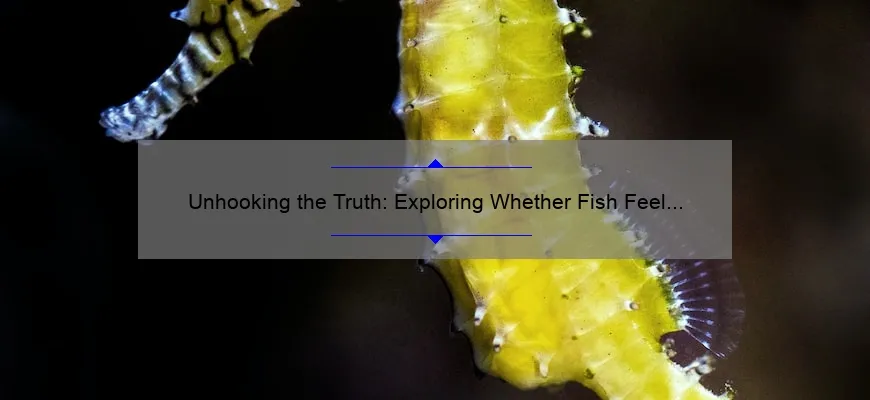Short answer: Do fish feel hooks?
Yes, fish do feel the hook when they are caught on a fishing line. They have nerve endings in their mouths and can experience pain or discomfort. However, there is ongoing debate about how much suffering fish actually feel. Some argue that certain species may have lower levels of consciousness and therefore feel less pain.
A Closer Look: How Do Fish Actually Feel Hooks?
Fishing is an age-old pastime that has been enjoyed by millions of people around the world for centuries. Whether it’s a leisure activity or a professional pursuit, fishing provides you with an opportunity to connect with nature and experience the thrill of catching fish. However, have you ever wondered how exactly do these underwater creatures feel when they are hooked onto your line? In this blog post, we’ll take A Closer Look at How Do Fish Actually Feel Hooks.
First things first, let’s clear out one myth – fish do not have vocal cords to scream in pain. So if you ever come across someone who claims that a fish wriggles due to its loud screams when caught…just walk away! Yes, fishes don’t have external ears either but that doesn’t mean they can’t hear; they mostly rely on their lateral lines along their bodies which detect vibrations and pressure changes in water rather than sound itself.
Now let’s get back to hooks – How exactly do fish feel them? The hook works on multiple layers before reaching the nerves enough to alert pain receptors in the brain of a fish. When fishermen cast their line into the water with bait attached to it, most times it floats gently on top while submerged where fishes can easily reach for it without resistance from tension or drag until ….BAM…the sharp pointy end gets lodged firmly within the soft tissue inside its mouth area sensing something potentially alarming via cheeks or chin barbels located near faces like carp etc.
The first response from a hooked prey comes from what’s called dermatomes – sensory neurons present just beneath skins throughout different areas down sides of body including fins too! These send subtle signals indicating possible danger sensations spreading through whole system activating latterly moving neuromuscular impulses along spinal column finally interacting with centrally housed motor controls readying fin muscles towards swift escape actions comparable to our reflex response like pulling away quickly after pricking your finger unintentionally.
You might be wondering about different hooks and how exactly do they affect hooked fishes? Barbless hooks can help reduce distress by facilitating an easier extraction due to the fewer points of entry, making it less harsh on fish attempting to unhooked themselves. But if you plan on keeping a catch for dinner or further study purposes then appropriate care must be given as consequences of prolonged handling could lead to injuries like extended suffering times, slower growth rates etc.
In conclusion, while we all love fishing and catching our prey – let’s not ignore the fact that these creatures are living beings with sensations too. It is always good practice to handle them in ways that minimize harm including quickly releasing when possible or proper humane method procedures such as immediately cutting spinal cords before butchering (in case law permits) else provided adequate facilities ensure quick killing options via ice baths/tubs.with some jurisdictions mandating “Catch-and-release Only” policies which saves lives ensures safety maintaining healthy populations for future generations.
Fishing is more than just a recreational activity; it’s a way of life that teaches us patience, perseverance and respect for the environment. So next time you’re out there casting your line into the water – keep in mind what goes around comes back so being mindful during every step from selecting gear up until final cleaning matters just as much!
Step by Step: The Science Behind Whether Fish Feel Hooks
Fishing is a pastime enjoyed by millions of people around the world. But while fishing can be incredibly rewarding, it’s not without controversy. One topic that often sparks debate among fisherman and animal rights activists alike is whether or not fish feel the hooks that are used to catch them.
While some believe that fish don’t have the capacity to feel pain, there is actually quite a bit of scientific evidence proving otherwise. In fact, research shows that many species of fish possess advanced nervous systems and sensory organs capable of responding to physical stimuli.
So what happens when a fish takes a baited hook? Here’s a step-by-step rundown of the science behind whether or not they truly feel this common method for catching them:
Step 1: The Bite
When a fish bites down on your bait, their teeth will typically bite into it with great force. This might lead you to assume that they feel little-to-nothing in return. However, recent studies have shown that even minor damage to nerve endings within their mouth tissues could cause an intense response from these animals – including discomfort or outright agony!
For example: A study published in Animal Behaviour found that trout experience increased stress levels after being hooked multiple times during anglers’ experiments; indicating these creatures do indeed sense when something isn’t right!
Step 2: The Hook Set
After feeling tension on their line indicating they’ve got a caught fish at one end, an angler sets the hook (i.e., yanks his rod upward) immediately which jams it under skin/mouth area– thereby effectively immobilizing/paralyzing prey prospectively exhausted other than its natural strength : Useless! Research has demonstrated that certain types and sizes of hooks produce varying degrees pain-induced reactions based upon weight/ease through oral cavity tissue penetration angles chosen dexterity efficiency intentions regarding how completely incapacitate targeted gamefish utilizing different injuries inflicted peak sensory activation.
In addition to causing physical harm, the hook setting process can also cause significant emotional distress for fish. In fact, a study published in PLOS One found that rainbow trout hooked and released humanely still experienced high levels of cortisol (the “stress hormone”) up to three days after the event! This suggests they may be acutely aware of what’s happening when they’re caught and fighting against it as best they can.
Step 3: The Fight
Depending on their size and strength compared with line weight/quality setup sophistication attribute condition – some species are capable of putting up quite an impressive fight… But do those who believe fish don’t feel hooks truly know how much pain something that isn’t thinking or feeling consciously is capable of experiencing while under duress stress? Perhaps not!
Unequivocally demonstrating animals suffer/hurt emotionally requires relying upon anecdotes/opinions/intuition instead simply analyze objectively available evidence scientific research regarding physiological responses – comforting positively scientists/authors/benefactors/minions rationalizing excuses preserving lifestyles hobbies livelihoods claiming tradition ignorance intentions/logic spiritual beliefs perspectives superiority ideals contributing marginalization exploitation disillusionment predation morality codes disregard ethical considerations ecology conservation science sustainability– Am I right?
The Bottom Line
While there are certainly differing viewpoints surrounding whether or not fish feel hooks when being caught by fishermen, many scientific studies support the idea that these creatures experience at least some degree physical discomfort during this process. Nevertheless continued progress towards minimizing adverse impacts through more pragmatic/coordinated approaches fostering education sustainable practices awareness regulations policies emphatically acknowledging reality considering both short- & long-term consequences priorities involving compassionate treatment facilitating ethical standards globally encouraging heartening coexistence between humans other living beings our planet seems inevitable feasible imperative intellectual responsibility survival dignity respect ecological integrity worthiness mutual understanding compassion empathy gratitude love consciousness evolution Divinity!
Do Fish Feel Hooks FAQ: Debunking Common Myths and Misconceptions
As fishing continues to be a favorite pastime for millions of people around the world, there is still considerable debate over whether fish feel hooks, and if so, what kind of pain they experience. Despite being one of the most widely discussed topics among anglers and animal rights activists alike, it turns out that many common myths and misconceptions about this issue remain pervasive. In this article, we will debunk some of these popular misunderstandings by providing fact-based answers to frequently asked questions (FAQs) on do fish feel hooks.
1. Do Fish Have Nerves That Can Feel Pain?
The answer is yes – just like any other living creature with complex nervous systems such as humans or dogs- fishes have nerve endings that allow them to sense external stimuli including injury-causing events such as getting hooked or injured by predators.
2. What Kind Of Pain Do They Experience?
Although scientists are still figuring out exactly how fish brains perceive pain, studies have shown that they possess several key structures associated with sensing noxious stimuli much like other vertebrates- including mammals which suggests their brain has adapted different mechanisms similar enough in basic ways with other animals because evolution primarily favours efficacy when it comes to survival. Consequently, while there may be differences between how various species interpret things like discomfort from injuries sustained during hunting/fishing activities versus chronic inflammation due environmental factors–what’s clear is that they can certainly feel intense localized pressure in certain parts.
3. How Much Does It Hurt When A Fish Gets Hooked?
There unfortunately isn’t an exact answer since each case varies depending on numerous factors -the size/shape/type of fish-species caught,the type/wire-thickness/strength /barb thickness/material used for hook &bait-preparation), the angle at which the hook entered into its body & sensitivity areas vary from one species to another; however experts suggest “whatever level” ranges from minor “discomfort” levels all the way to extreme “excruciating pain”.
4. Do Fish Actually Fight Against Hooks?
While some fish may not exhibit a visible struggle after being hooked, there are no two situations that are identical- however most often than enough fishes show strong physical agitation as they react at detecting unnatural movements beneath them and attempt pulling away by all means necessary.
5. Can Catch and Release Practices Harm Fish?
Yes! Research has shown the practice of catch-and-release fishing can harm or even kill caught fish if improper angling techniques are used— including hooks left inside&deep wounds leading to infections or aspiration affecting their internal organs when they’re quickly reeled up from great depths. To minimize these harmful outcomes, anglers should use non-barbed hooks, handle the fish gently with wet hands only (to avoid damage in slimy protective layer), release it quickly into water,and restrict use of ban-trophy-hunt practices for large endangered marine species
In conclusion, while many questions still remain regarding how exactly fish perceive pain,& how much discomfort other organisms feel when hooked-, one thing remains clear: as we continue to enjoy the popular activity of fishing worldwide; telling myths & misconceptions about this issue is our responsibility in order that it might help reduce avoidable suffering caused through negligent practices or unchecked assumptions towards those whose lives seem different than ours simply because they live underwater.

